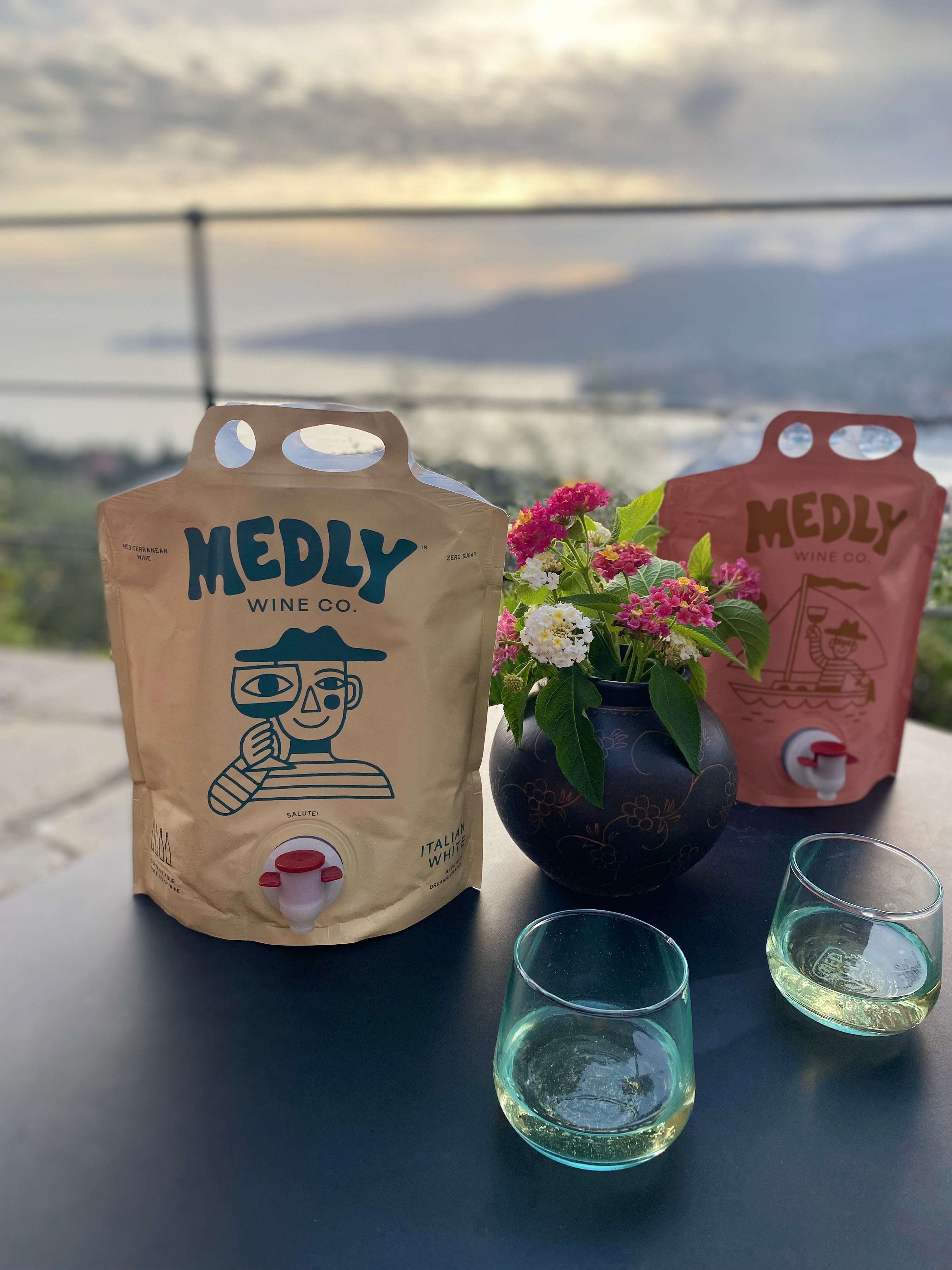Introduction to Organic Wine:
Have you ever asked yourself, “what is organic wine?” Do you wonder what makes organic wines different from conventional wines, or why organic wines are said to be better than conventional wines? Let’s get into it.
Wine enthusiasts and eco-conscious consumers alike are increasingly drawn to organic wines. Producing wine using natural processes and minimal intervention offers a healthier, more environmentally friendly alternative to conventional options.
Because organic wines are grown without the use of herbicides and pesticides, the vineyards are biodiverse and rich environments that support an abundance of life. ANd, you don’t consume harmful chemicals (most commercial wines contain up to seven pesticides and herbicides that transfer into them from the vineyards) either.
These abundant vineyard ecosystems maintain a natural state of balance and produce some of the best fruit possible compared to using conventional methods. But what exactly is organic wine, and why does it matter? Below, I’ll explain what organic wine is, talk about the benefits of growing and producing organic wines, and how to select the best wines for your palate and your budget.
What is Organic Wine? Understanding the Basics:
Definition of Organic Wine
Organic wine is crafted from grapes grown without synthetic pesticides, herbicides, or chemical fertilizers. The winemaking process avoids artificial additives, ensuring a more natural product. Organic wines contain far less sulfites, little-to-no sugars, and are typically a bit lower in alcohol. Simply put, organic wine production celebrates purity and respect for the environment, giving you a better product that is healthier for you and for the lands we all share.
Certification Requirements for Organic Wine
To carry the organic label, wines and the wineries that produce them must meet strict certification standards. These certifications—such as USDA Organic in the United States or EU Organic in Europe—verify that the grapes are organically grown and the winemaking process adheres to strict organic principles. Another recent addition to the certification requirements in the U.S., enacted in 2024, is that all importers of organic wines must be certified by the FDA to ensure strict guidelines are in place to handle and distribute certified organic products. Medley Wine Co., for instance, ensures all its products meet all of these standards, including being an FDA certified organic importer, offering consumers assurance and peace of mind.
Comparison to Conventional Wine
Unlike conventional wines, which may use synthetic chemicals and additives, organic wines rely on sustainable farming and minimal intervention. Organic wines are free from additives that many conventional wines contain and must maintain strict standards in the cellar as well as the vineyards. These differences are evident in vineyard management practices, pest control methods, and even the wine's final flavor profile.

The Organic Winemaking Process:
Organic Farming Practices
Let’s talk about how organic wine is made. Organic wine begins in the vineyard. Organic farmers prioritize soil health, biodiversity, and sustainability, avoiding synthetic pesticides and fertilizers. Instead, they use natural methods like cover crops, composting, and natural pest management (using friend and foe insect balancers) to maintain a thriving ecosystem.
Wine Production in Organic Wineries
Organic winemaking minimizes interference with the fermentation process. Native yeasts are often used, and additives are kept to a bare minimum, preserving the wine’s authenticity.
Sulfites and Additives in Organic Wine
Organic wines contain fewer sulfites than conventional options. While sulfites are a natural byproduct of fermentation, organic standards cap their levels to ensure a healthier and more natural product.
Health Benefits of Organic Wine:
Lower Additives and Fewer Sulfites
Organic wines appeal to health-conscious drinkers because they contain minimal to no additives (the U.S. approves up to 76 ingredients that can be added to wine without disclosing them on the label) and reduced sulfite levels, minimizing the risk of sensitivities or headaches.
Higher Antioxidant Levels
Organic wines often have higher concentrations of antioxidants like polyphenols and resveratrol, which are linked to heart health and other wellness benefits.
Low-Sugar and Low-Sulfite Wine
In addition to low sulfites, the natural and organic approach to winemaking also results in wines with lower sugar content, catering to those seeking balanced, health-friendly options. Low-sulfite wines and low-sugar wines process much easier and naturally in the human body. Doing so results in fewer-to-none of the after effects that can come from drinking conventional wines, which has been described by many as “hangover-free wine”.
Sustainability Benefits of Organic Wine:
Eco-Friendly Vineyard Practices
Organic viticulture promotes soil health and biodiversity, helping to restore and maintain the soils and their balanced ecosystems. By avoiding synthetic chemicals, organic wineries contribute to cleaner air, water, and soil.
Lower Carbon Footprint in Organic Wine Production
Choosing organic wine helps reduce carbon emissions. Creating and producing all those nasty synthetic chemicals that conventional wines use takes a lot of energy, resulting in high carbon emissions and harmful pollutants in the air. Sustainable farming practices, combined with eco-conscious production, create a product that’s better for the planet.
Medly Wine Co.’s Commitment to Sustainability
Medly Wine Co. exemplifies eco-friendly winemaking, from using renewable energy in production to using sustainable packaging. All partners in the supply chain are on the forefront of sustainable farming and production practices. By choosing Medly Wines, consumers support a greener future.
Choosing the Best Organic Wine - A Guide for Consumers:
Understanding Organic Wine Labels
Decoding organic wine labels is key to ensuring authenticity. Look for certifications like USDA Organic, EU Organic (ECOCERT), or other regional equivalents like ICEA in Italy.
Top Tips for Selecting High-Quality Organic Wines
When wondering how to choose organic wines, here are some basics to help you get started. Instead of asking, “what are the best organic wine brands?” use the following approach to determine which ones suit your pallet and what is “best” for you.
-
Know Your Region: Some areas are renowned for organic viticulture, offering exceptional quality.
-
Check the Label: Certifications, vintage details, and production notes can reveal much about the wine. Wineries that make wine in an organic and natural way will usually want to talk about it and provide that info on the label
-
Knowing Your Taste Preferences: When choosing any wine, read the labels and do a little research to determine if the wines you are considering meet your flavor preferences. If there are specific varietals that you generally prefer, that’s a good starting point.
Medly’s Organic Wine Collection:
Medly’s curated selection of organic wines showcases the best the industry has to offer. We create our proprietary blends with the best winemakers in the Mediterranean. Medly wines are fruit-forward and are meant to be enjoyed while the wines are still young. Medly’s red wine is fruity and soft on the pallet and is an incredibly easy-drinking wine. Medly’s white and rose wines are delicate, fruity, and crisp - known for their drinkability and beautiful fruitiness.

FAQs about Organic Wine
What is the difference between organic and biodynamic wine?
Biodynamic wines take organic farming and production to another level, encouraging biodiversity in the vineyards that go beyond just using organic materials. Biodynamic wine follows organic principles but incorporates holistic, lunar-inspired farming practices. One example is the practice of harvesting at night, during the right time of the lunar cycle, which preserves aromatic potential due to the natural push and pull that the planet experiences during different phases of the moon.
Is organic wine better for you than conventional wine?
Yes, organic wine often contains fewer additives and higher antioxidant levels, making it a healthier choice.
Does organic wine have fewer sulfites than conventional wine?
Absolutely. Organic wines have significantly reduced sulfite levels, meeting stringent organic certification standards.
Organic wine isn’t just a beverage choice, it’s a lifestyle choice that supports health, sustainability, and eco-conscious living. From reduced additives, low sulfites, to environmental vineyard practices, the benefits of organic wine are compelling. Are you ready to explore the world of organic wine? Dive into Medly Wine Co.’s collection to discover your new favorite organic wines. Don’t forget to sign up HERE for updates and exclusive offers!
To happiness and health!
Aaron





